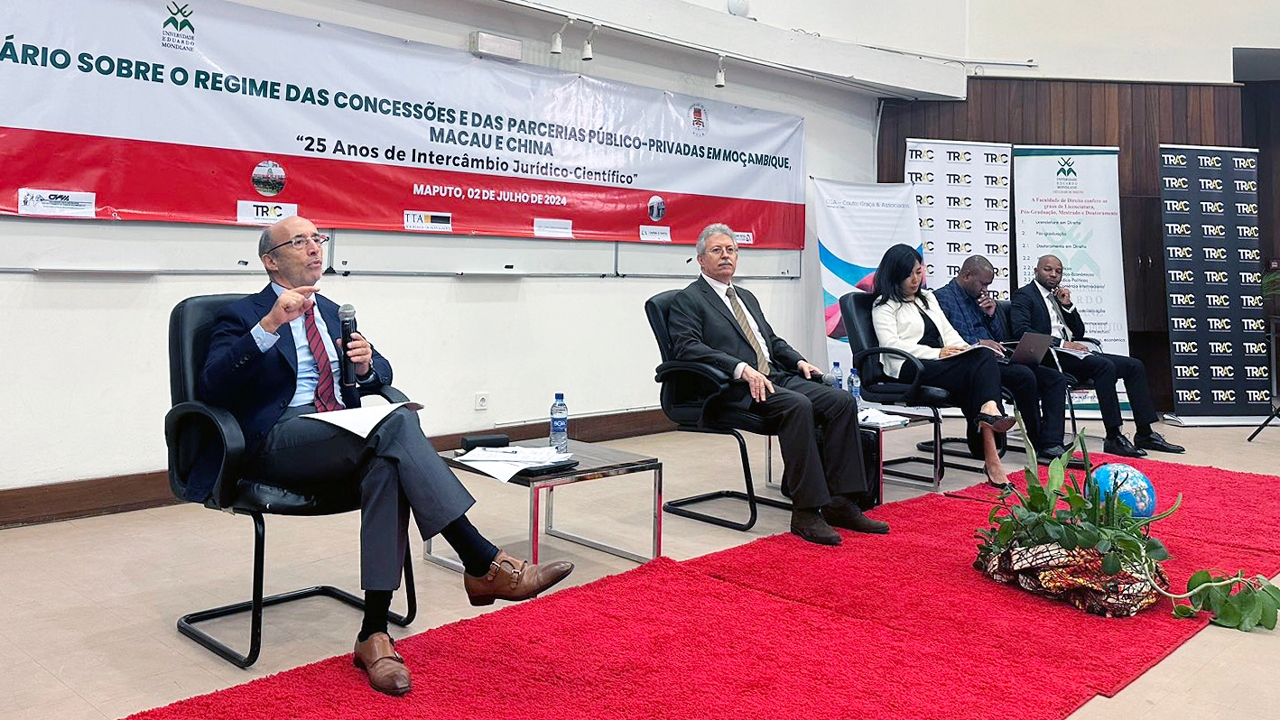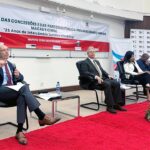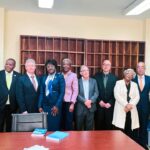 The delegation and the Faculty of Law of Eduardo Mondlane University jointly hold a seminar
The delegation and the Faculty of Law of Eduardo Mondlane University jointly hold a seminar
To leverage Macao’s role as a bridge between China and Portuguese-speaking countries and respond to the national call for the cultivation of foreign-related legal talent, a delegation led by Tong Io Cheng, dean of the Faculty of Law (FLL) and director of the Centre for Judicial and Legal Studies of China and Portuguese-Speaking Countries at the University of Macau (UM), visited renowned universities and law departments in Mozambique and Angola. During the visits, they studied international legal issues in depth and explored ways to empower international legal professional development programmes.
In Mozambique, the FLL delegation visited the Faculty of Law of Eduardo Mondlane University (UEM). The two parties jointly held the seminar ‘Celebrating 25 Years of Cooperation: Public-Private Partnerships and Their Applicability Issues in Mainland China, Macao, and Mozambique’, and released a special publication on their cooperation. The delegation also participated in a seminar on the celebration of the 50th anniversary of the Faculty of Law of UEM, during which they discussed the importance of research development in universities, the trend towards the internationalisation of legal education, and the exchange and integration of the Chinese and Portuguese legal cultures. Moreover, the delegation met with Manuel Guilherme Júnior, rector of UEM, and Eduardo Chiziane, dean of UEM’s Faculty of Law. The two parties explored and discussed potential cooperation in academic research, faculty training and student exchanges, with a view to improving the quality of legal education and deepening cooperation between the two universities.
In Angola, the FLL delegation visited Agostinho Neto University (UAN), where they attended a seminar organised by the Center for the Study of Legal-Economic and Social Sciences of UAN. The delegation also met with Pedro Magalhães, rector of UAN; André Victor, dean of the Faculty of Law of UAN; and José Octávio Serra Van-Dúnem, director of the Center for the Study of Legal-Economic and Social Sciences of UAN. The two parties exchanged views on promoting student exchanges, strengthening cooperation between faculty members, and organising joint seminars and research programmes. They also agreed to strengthen academic exchanges and engage in collaborative academic research.
In addition, the FLL delegation visited the Constitutional Court of Angola and its library, where they exchanged views with Laurinda Prazeres Cardoso, president of the court, and several judges on the judicial systems and frameworks of China and Angola. Both parties agreed that the joint publication of research findings and the promotion of cooperation would be beneficial to both sides.
The visits to Mozambique and Angola have solidified the foundation for cooperation between UM and universities in Portuguese-speaking countries, and have a positive effect on promoting cooperation between China and Portuguese-speaking countries in the fields of science, education, and judiciary. UM will continue to cooperate with Mozambique and Angola in legal education, scientific research and judicial exchanges, thus contributing to regional and international academic exchanges and talent cultivation.
The delegation also included the following FLL representatives: Manuel Trigo, director of the Centre for Law Studies; Jiang Yiwa, associate director of the Centre for Law Studies; Ma Zhe, associate director of the Centre for Judicial and Legal Studies of China and Portuguese-Speaking Countries; Augusto Teixeira Garcia, part-time associate professor; Luís Pessanha, part-time lecturer; and Miguel Quental, part-time teacher.




